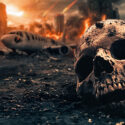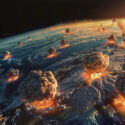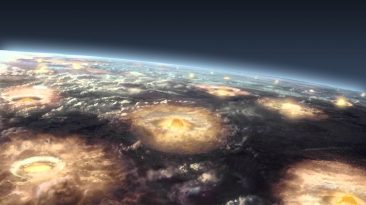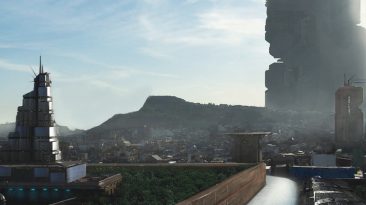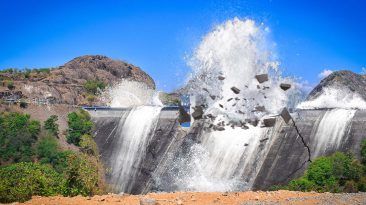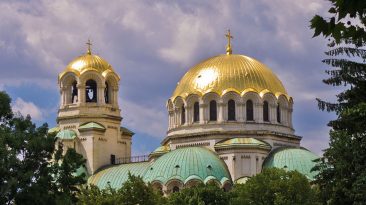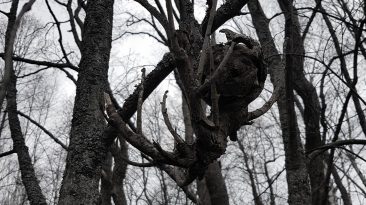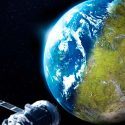The world has ended. The sky has fallen. Doomsday has come and gone. So now what? Let’s start rebuilding civilization, of course. How would you begin to come back from an apocalypse? What could you use from the remains of our old society? And how would you be able to remember anything?
While you may be wondering how exactly the world ended, that’s not so important. It could have been a deadly virus, a massive asteroid collision or nuclear war. It could even have been all of the above. What’s more important is that you are among the lucky survivors of this doomsday scenario. But you would have lost a few things that were essential to the life you led before.
The internet and computers no longer work. Libraries and databases have been destroyed. And many of our world’s knowledge keepers like scientists, engineers and doctors have tragically perished. But you wouldn’t have much time to mourn. If you wanted to keep the torch of humanity lit through these terrible times, you’d need to focus on what you could do with all the other survivors to, well, survive. And to start rebuilding society you’d really only need three essential things.
In his book, The Knowledge: How to Rebuild Our World from Scratch, astrobiologist Lewis Dartnell says that even though there have been many things vital to our society’s development, there are three essentials that stand out above all else. Food, fire and knowledge. You’d need to figure out how to ensure everyone gets the food and nutrients they need to survive.
You’d have to harness sources of power to make tools and fuel transportation. And lastly, you’d want to share and record that knowledge, so that your society’s future could continue to thrive. And while you could consider yourself a smart cookie with a sense of rugged individualism, you wouldn’t be knowledgeable enough to rebuild things on your own.
You’d need the collective wisdom and strength of everyone around you. And be ready to ask questions and explore outcomes. Step one to rebuilding society would involve the most important thing, staying alive. In the beginning, you’d have to get by with no power, no antibiotics and none of the comforts of our modern world.
During this period of time, people would need clean water, shelter and fire for warmth. If you don’t already know how to take care of these things, you’d better find people who do ASAP. Step two would rely on scavenging what remains of society to find things that could be useful to you and others. First and foremost, that would mean going through supermarkets for anything with a long shelf life.
This wouldn’t be a long-term solution. But it would at least tide you over and keep your stomach growling to a minimum. Growing a wide variety of foods would be an essential next step. And then, of course, you’d want a way of preserving them. Grains like wheat, rice and corn have been some of the most important crops in human history. They grow fast and fill us up.
Put the focus on them first. You’d need to develop technologies to grind grain into flour. Similar to the ancient Roman water wheel or medieval windmill. Otherwise, you’d be stuck doing it all by hand. Hopefully, it wouldn’t take you and your community too long to figure out something that works. Then you’d finally be able to concentrate on more complex things.
Like power sources other than fire. After years of rebuilding the basics, it may be tempting to think you could pick up exactly where modern society left off. By burning fossil fuels. But you’d find that we’ve already used so much of these resources up, they would no longer be so easily accessible. You’d need to build extremely complex drilling systems in very remote areas. And that wouldn’t be so realistic after an apocalypse.
You’d likely be limited to burning things. And if you want to start any large-scale industrial projects, such as making steel, bricks or glass, you’d need to burn a lot of fuel. Charcoal would probably be the best available option. Charcoal burns hot. Hotter than coal. It’s practically carbon neutral too, so this would be a relatively sustainable model to rebuild your society with.
You could take a few lessons from Brazil, which is currently the largest charcoal producer in the world. Just take your timber, air-dry it, pile it into a soil-covered mound and let it smolder. If that’s not sustainable enough for you, I’m sorry to say that you wouldn’t be able to jump right into using renewable energy. While it would seem nice to throw up a bunch of solar panels and call it a day, they are made from pure silicon. And silicon is sand processed in a complicated manner you wouldn’t be able to replicate just yet.
And then there’d be possibly the most important step of all, communication. Connection is vital for human beings. You’d need to find and talk to other survivors in order to save the human race as a whole. On a small scale, you could communicate with your local community by teaching people and inspiring them. Stories are a great way to retain information.
A well-told story could make it 20 times easier to remember important facts. To find survivors beyond your immediate surroundings, basic technology, like a radio, would be vital. This could seem simple, but it would be even more complex than building a toaster from scratch. If you managed to figure it out, the next challenge would be communicating messages.
This is where something like Morse code would come into play. But there’s a good chance you’d have to learn that from scratch. The upside is that even if the people receiving the message can’t understand it right away, they at least know there are others out there. Once you established contact with other communities, you could start trading with them.
You could share resources and information. And that would improve both communities’ ability to survive. Piece by piece, you’d be on the road to rebuilding society. And who knows, maybe you’d be off to a better start since you’d be using the power of your collective intelligence and will to survive. Or maybe you’d like to see how well you’d fare if you were the only person left on Earth.
Sources
- “How To Rebuild The World If We Survive The Apocalypse”. Nicholas Stubbs. 2014. wired.co.uk.
- “A 7-Step Guide For Rebooting Civilization After The Apocalypse”. Lewis Dartnell. 2014. time.com.
- “Could We Reboot A Modern Civilisation Without Fossil Fuels? | Aeon Essays”. Ed Lake. 2015. aeon.co.
- “What Makes Storytelling So Effective For Learning?”. Vanessa Boris. 2017. harvardbusiness.org.
- “After A Zombie Apocalypse, Here Are 9 Keys To Rebuilding A Civilization”. Kimberly Hickok. 2018. livescience.com.





